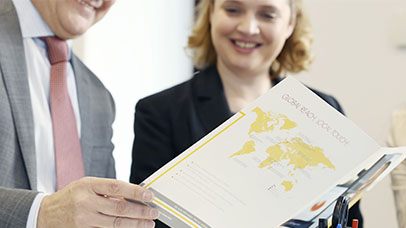Examples of incentives
Indonesian Investment Tax Allowance
In Indonesia, an Investment Tax Allowance (ITA) incentive offers companies additional tax relief (over and above tax depreciation) of 30% of the amount invested in tangible fixed assets. This relief is spread over a six-year period from the start of commercial production and is deductible against taxable profits.
ITA is part of the Indonesian government’s commitment to encourage new investment and expansion in designated locations or business sectors, such as lubricant manufacturing. In order to qualify, businesses must meet investment thresholds among other requirements.
Shell invested in a lubricant oil blending plant in the Marunda Centre of Bekasi, West Java, which began operating in 2015. The plant is equipped with automated lubricant blending, filling and packaging technology and a quality control system that tests lubricants at all stages of production to ensure products meet high-quality specifications. The Indonesian government approved Shell for ITA in 2015.
In March 2020, we announced additional investment to double the production capacity of the plant. We intend to apply for the ITA for this expansion.
Brazil suspends certain indirect taxes on energy investments
Brazil is seeking to lessen its dependence on oil and to develop other resources, like natural gas and renewables. Brazil offers a tax incentive known as REIDI that is designed to attract investment in key sectors, like energy. REIDI suspends the payment of indirect taxes on the purchase of equipment that is due to be installed in a qualifying asset. Once the equipment is installed, indirect taxes are no longer owed on this equipment.
Marlim Azul Energia S.A., a non-operated joint venture (Shell interest 29.9%), is applying the incentive in the construction of a natural gas-powered thermoelectric plant.
Malaysian incentives for marginal and deep-water investment
Revenues from oil and gas contribute significantly to Malaysia’s economic development, serving as one of the government’s main sources of income. The government is focused on enhancing output from existing oil and gas fields and new marginal fields, as well as deep-water opportunities. To draw investment in these areas, the government introduced a range of tax incentives.
Shell’s Upstream business in Malaysia benefits from two key incentives: the Investment Allowance (IA) incentive for specific qualifying projects, such as deep water or enhanced oil recovery (EOR), and the Marginal Field Tax Incentive (MFTI).
In 2018, Malaysia granted Shell the IA incentive for the Petai and Malikai deep-water projects, effective from 2011. In 2016, Shell received approval for an IA related to EOR projects in the Baronia and Bokor fields, effective from 2014.
Under the IA incentive, Shell can offset additional investment costs against the income of a qualifying project. Any unused allowances can be carried forward.
Shell in Malaysia also receives incentives for marginal fields. In 2020 for example, Malaysia approved Shell’s eligibility for the MFTI for the Gorek field which it operates under a production sharing contract with SapuraOMV. A marginal field is a field that cannot be profitably developed without incentives. Under the MFTI, Shell’s chargeable income will be taxed at a lower rate of 25% and export duties on oil and gas exported from the Gorek field will be waived. The incentives are available to Shell while the reserves remain at a marginal level and extractive costs could make the project unviable.
Incentives for manufacturing businesses in Louisiana
The state of Louisiana offers tax incentives to manufacturing businesses that contribute to job creation and hire people who may not find work elsewhere due to a lack of basic job skills or who receive some form of approved public assistance.
Shell completed the expansion of its Geismar chemical plant in south Louisiana in 2018. We benefited from Louisiana’s Industrial Ad Valorem Tax Exemption Program (ITEP) and Enterprise Zone incentives for our investments in this site.
The ITEP incentive is available to manufacturers who commit to a required level of jobs and payroll in the state. The programme provides an 80% property tax abatement for an initial term of five years and the option to renew for five additional years, if investment qualifications are met. Businesses must be classified as a manufacturer or related to the manufacturing project at the project site in order to receive benefits under ITEP.
The Enterprise Zone is an incentive for businesses that are creating new full-time jobs and hiring at least 50% of those jobs from economic groups that may not otherwise gain employment. The benefits to business include a one-time tax credit and a rebate of state sales-and-use taxes paid on qualifying plant and machinery. The credits and rebates have a financial cap.

Shell started production at the expanded Geismar chemical plant in south Louisiana, USA on January 7, 2019.
Tax incentives to drive innovation
Innovation and technology are vital to providing a wider, more sustainable mix of energy resources for the world’s growing population. We invest in research and development to find reliable, affordable and lower-carbon energy.
A large part of our R&D takes place in technology centres including in the Netherlands, the UK and India. Thousands of Shell scientists, researchers and engineers across these locations work to improve the efficiency of our products, processes and operations.
We collaborate with public and private entities, including universities, government laboratories and technology start-ups to accelerate the development and deployment of energy solutions. We spend almost $1 billion on R&D each year.
Many governments and international organisations seek to encourage R&D, offering tax incentives to businesses that invest in technological innovation. Some of our R&D programmes are eligible for incentives, which can be tax-based or offered as subsidies. Where available and appropriate, we apply for these incentives.
 Message from the Chief Financial Officer
Message from the Chief Financial Officer
 Shell’s approach to taxes
Shell’s approach to taxes
 Special topics
Special topics
 Our tax data
Our tax data
